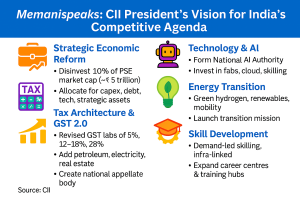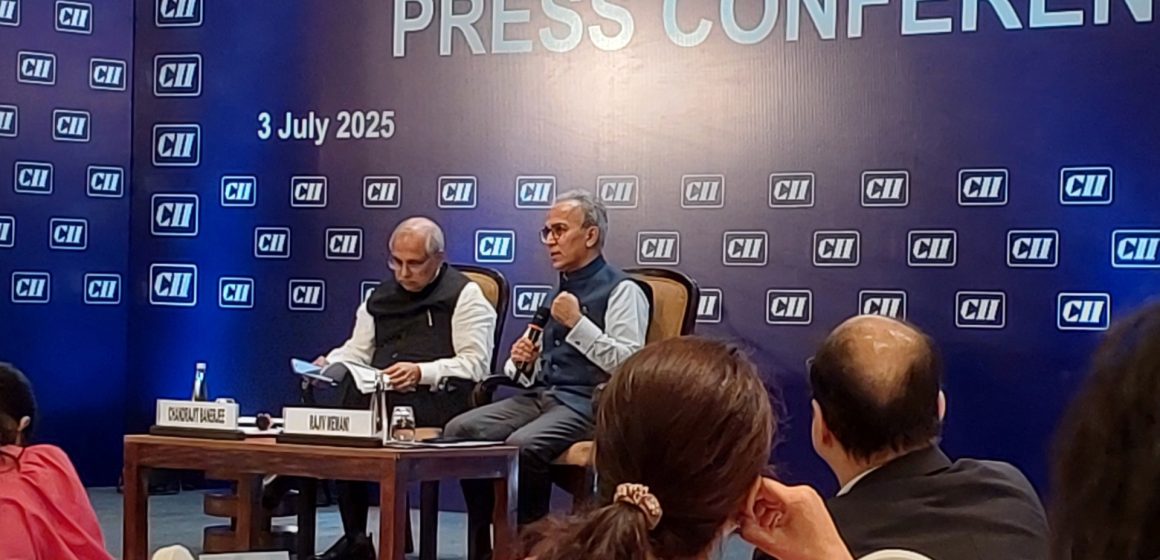The new CII president’s recommendations on disinvestment, taxation, manufacturing, AI and skilling come as India is poised to retain its position as the world’s fastest-growing major economy, despite sustained global economic and geopolitical turbulence.
While India remains a bright spot amid persistent global economic and political volatility—with internal momentum buffering external shocks—it must now aspire to sharpen its competitive edge, Rajiv Memani, President of the Confederation of Indian Industry (CII), has asserted.
“Competitiveness is India’s passport to prosperity. But it must be earned through reform, innovation, and trust,” Memani stated at his first press conference since taking charge in June from Sanjiv Puri, Chairman & Managing Director, ITC.
The new apex industry chamber head also serves as Chairman & CEO of Ernst & Young India. A qualified chartered accountant, he has been a member of several high-powered government committees, including the Ministry of Finance task force that drafted the country’s new Direct Tax Code in 2019.
Among key proposals, he urged calibrated disinvestment of public sector enterprises to bolster government revenues while maintaining fiscal balance, critical for supporting India’s development and infrastructure ambitions.
“About 10 per cent of the total market capitalisation, which is about ₹55 trillion, rests with PSEs. We could look at divesting about 10 per cent of this market cap which could yield about ₹5 trillion. These proceeds could be utilised for enhancing public capex, retiring government debt, setting up a sovereign wealth fund for investing in strategic assets overseas and acquiring critical technologies.”
Memani also advocated a reimagined tax architecture under the proposed GST 2.0 framework.

“GST has been a big boon for India in the way it has integrated the economy and formalised sectors that were previously informal, but it’s time to look at GST 2.0. We need to simplify the rate structure, especially for products primarily consumed by the bottom 20-30 per cent of the population from an income standpoint.”
The suggested reforms include a 5 per cent rate on essential items, 28 per cent on luxury and sin goods, and a uniform slab of 12-18 per cent across other categories. He sought the creation of a national appellate authority to reduce litigation and recommended the inclusion of petroleum, electricity and real estate within the GST ambit.
He reiterated that with the Indian economy projected to grow by 6.4-6.7 per cent in FY2026, it would continue to hold its place as the world’s fastest-growing major economy.
Expanding Scale, Productivity, Innovation, Resilience
Highlighting the urgency of adapting to the rapidly evolving rules of trade and technology, Memani emphasised the need to root India’s competitiveness in scale, productivity, innovation and resilience.
“It is our moment. But we must act decisively to seize it.”
To enable this transformation, he called for a combination of policy and structural initiatives. These include streamlining environmental regulations through a unified compliance framework covering both central and state clearances, launching a capital support scheme for small and medium enterprises in the manufacturing sector, and constituting a dedicated task force to address land availability at affordable rates.
Beyond these proposals, Memani advocated the establishment of a national body focused on artificial intelligence (AI).
“To position India at the frontier of global technological transformation, CII strongly advocates the formation of a National AI Authority to coordinate policy, infrastructure, and AI adoption, alongside investments in semiconductor fabs, cloud infrastructure, and AI skilling programmes,” he added.
Talking about energy transition, Memani suggested formulating sector-specific strategies, including for mobility, and called for the proactive development of green hydrogen and renewable energy hubs.
“CII would also be launching a mission on energy transition, to encourage industry to shift to low-carbon alternatives,” he said.
To meet the evolving skilling demands across sectors, he recommended the introduction of a national demand aggregation mechanism alongside the concept of skilling-as-infrastructure, integrating skill development directly into investment pipelines. He emphasised that CII is already leveraging its deep industry connections to make skilling demand-driven through its network of model career centres and multi-skills training institutes.
Manish Pant


